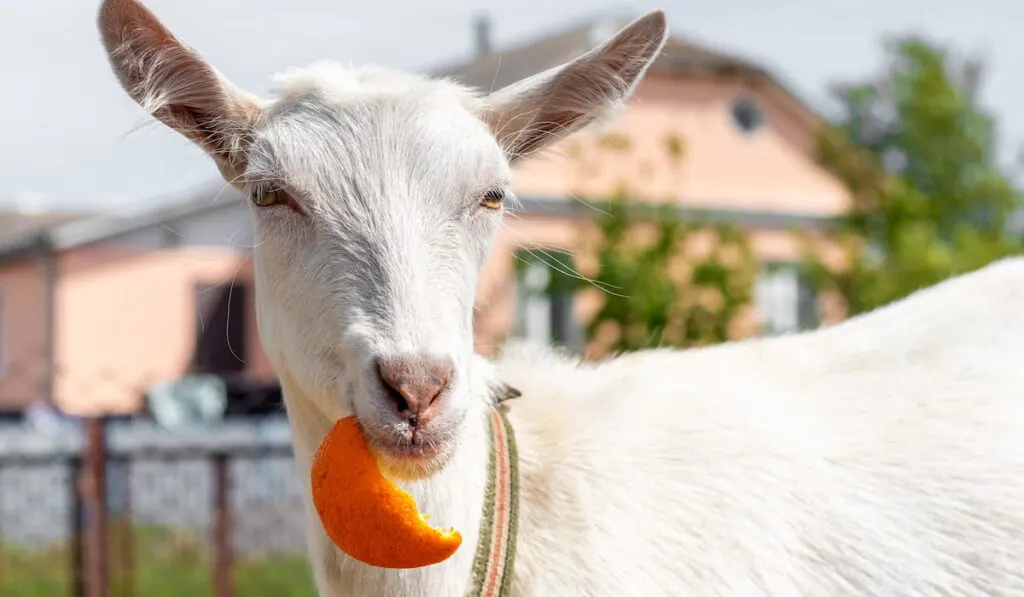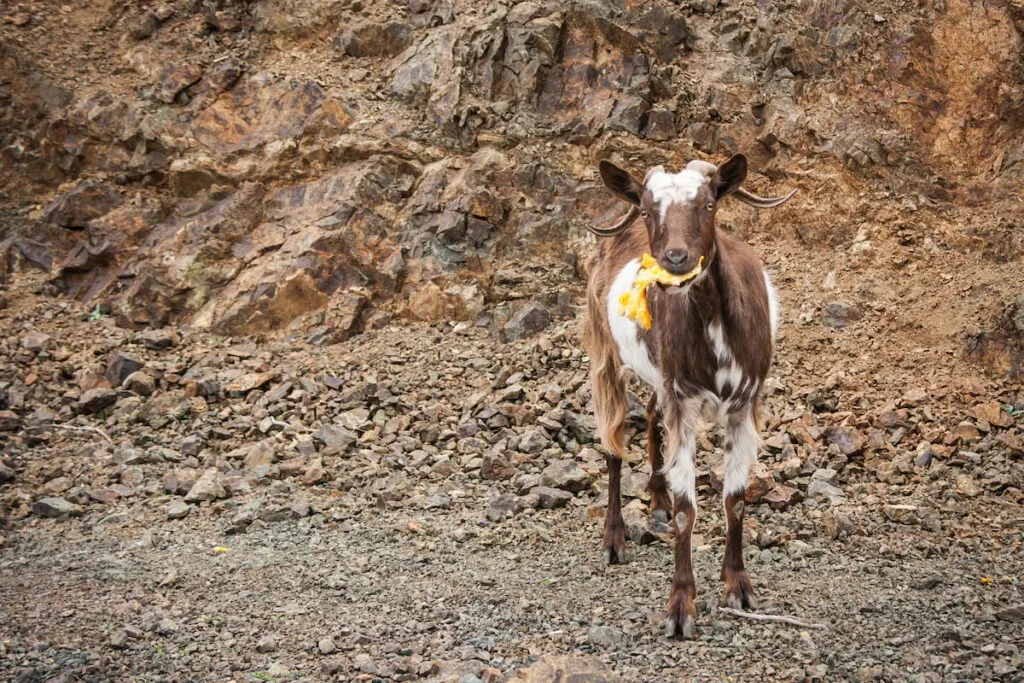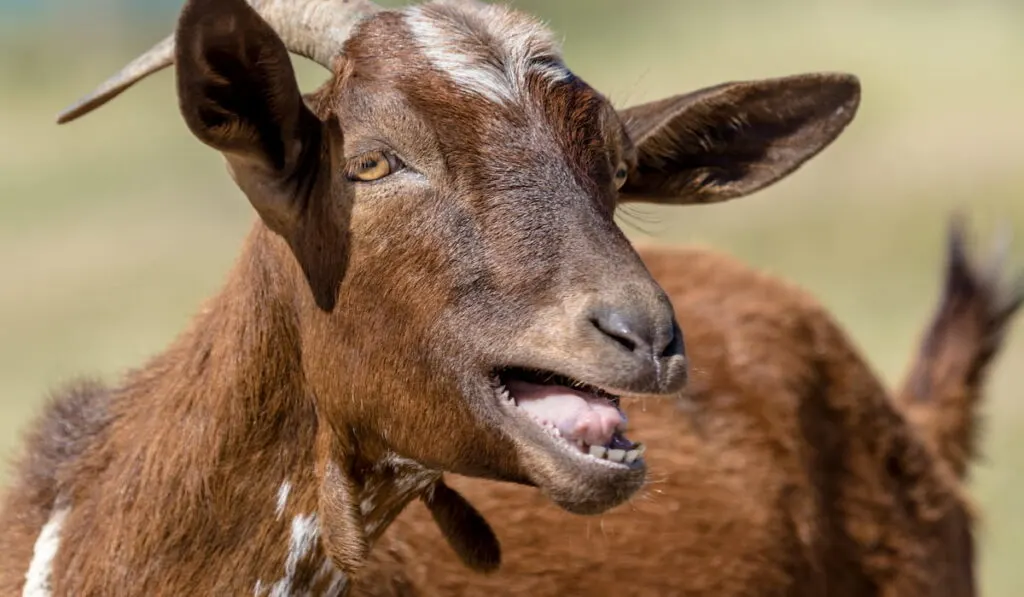Do goats eat oranges?
Yes. Just like for humans, oranges are a rich source of vitamin C, so very nutritious for goats.
Other nutrients found in oranges are vitamins B1, B9, potassium, folate, and thiamine, all of which are very healthy and essential for boosting the goat’s immune system and beneficial to the goat’s diet.

Oranges should, however, only be fed to the goats as an occasional treat or snack.
Avoid overfeeding them citrus, which could lead to too much accumulation of acids in the goat’s rumen. This could end up being catastrophic and hurt your goat’s rumen.
The rumen, being the first stomach compartment in a goat, produces enough vitamin B for the goat’s body.
Oranges are therefore a good source for other vitamins essential for the goat’s daily functions, especially for breaking down fats and oils, such as vitamins C, D, and K.
It should also be noted that goats do not have any reservations about food, as they are neither picky nor have particular tastes for specific foods They’ll usually eat anything edible and available to them.
They do have “a sweet tooth” which makes them naturally attracted to oranges and other fruits.
Nutrition And Health Benefits of Oranges
Below is the nutritional composition of a 100 gram serving of orange:
- Water – 87%
- Proteins – 0.9 grams
- Calories – 47
- Sugar – 9.4 grams
- Carbs – 11.8 grams
- Fat – 0.1 grams
- Fiber – 2.4 grams
- Vitamins
- A – 14 mcg
- B1 – 0.114 mg
- B2 – 0.052 mg
- B3 – 0.369 mg
- B5 – 0.328 mg
- B6 – 0.079 mg
- B9 – 39 mcg
- C – 69.7 mg
- E – 0.24 m
As mentioned before, a goat’s rumen makes enough vitamin B required for their daily body metabolism, but cannot make fat-soluble vitamins such as vitamins A, D, E, and K.
The goat is therefore required to source these vitamins externally through foods rich in these nutrients. Oranges are a great source of these nutrients.
Oranges also contain substantially a large amount of vitamin C, which greatly boosts the goat’s immunity.
Among other minerals found in oranges essential for the goat’s diet are copper, calcium, potassium, and magnesium.
How about orange peels?
Goats do eat orange peels, and the peels are good for your goat.
For the record, orange peels contain more vitamin C than in the fruit’s flesh, making them a very rich source of the much-needed vitamin.
Some people/farmers may be hesitant about feeding the peels to goats and may boil and dry them before feeding them.
All that work is not necessary, as the goat’s digestive system is good enough to break down and digest orange peels.
So, instead of throwing away orange peels, you could feed them to your goats and for sure, they will enjoy it.
Can they eat orange seeds?
No. They, however, do not pose any threats or harm to the goat, and neither are they nutritious.
It is still a good to practice removing the seeds before feeding them to goats, just as we would do before consuming them.
If it’s too difficult to remove them or it will cause an inconvenience, you can leave them in and it would be totally fine.

How to feed oranges to your goat
Oranges are usually too soft for the goat to choke on. They are also already divided into carpels, making it easy for the goat to chew.
It is, however, good to cut the oranges into smaller pieces and remove seeds. It’s best to leave the peels.
Size matters when feeding all animals any kind of food, and it is good to be cautious about choking.
When feeding them the oranges without removing the peels, it is good to thoroughly wash the oranges to remove any artificial colors they might have on and get rid of any chemicals that could be toxic to the goat’s body.
It is also good to feed oranges in moderation to avoid overeating, which could be problematic to the goat.
Effects of overfeeding
After feeding, goats absorb their nutrients after fermentation in the stomach.
Sugar is essential for this process but at very low levels such that 3% of sugar becomes too much. Oranges are a very rich source of natural sugars.
Overeating oranges will therefore hike up the sugar levels in the stomach, leading to over-fermentation, which leads to bloating.
This can be very painful to the goat and should be avoided by feeding sugar-rich foods in moderation.
Can goats eat orange tree leaves?
Goats are browsers who are never picky about their food, especially leaves.
Citrus leaves are not an exception. They should, however, be eaten fresh off the tree, or when they are totally dry, or they could be toxic to your goat.
Wilting citrus twigs and leaves release toxic substances that would not be good for your goat.
It is also good to ensure that the leaves are clean and rid of pesticides and chemicals that could be bad for your goat.
Allow your goats to browse the leaves off the tree or dry them up.
Can baby goats eat oranges?
Compared to adult goats, baby goats have a weaker and more fragile digestive system.
Since they are also unfamiliar with many foods and feeds, they should exclusively feed on their mother’s milk for the first month.
After a month, you could start introducing other feeds such as hay and grain in small quantities for them to adjust their digestion to handle new feeds.
Oranges and any other citruses should only be fed after three to four months because they have high sugar and acidity levels, and by this time, the baby goat’s digestive system should be mature enough to handle the acids.
What other fruits can goats eat?
Fruits should only be fed to goats once in a while, as treats.
These nibblers are however always looking forward to the next treat.
Below are some of the fruits healthy for goats to eat:
Apples
They are rich in vitamin C, fibers, and potassium, good for the goat.
They are also delicious, and the goat will enjoy it more when served in small and chewable chunks.
Plums
Plums are rich in vitamins A, B1, C, and K, alongside other minerals like Potassium, Calcium, Phosphorus, Magnesium, Fluoride, and Zinc, all of which are good for your goat.
Watermelons
Watermelons have high water levels, making them a perfect refreshing treat for your goat.
They are also nutritious and rich in vitamins A, C, and Potassium.
Mangoes
They are a rich source of vitamin C, good for boosting the immunity of the goat.
Mangoes are also juicy and succulent and goats love them.

What to avoid when feeding goats
Goats are not that picky, but they can’t consume everything.
There are many plants and other feeds that could be toxic to goats. First off, meat and dairy products are a big NO for goats.
Goats are herbivores and their diets should entirely be plant materials.
For goats, consuming supplements and food from other ruminants could also lead to a condition called bovine spongiform encephalopathy.
Goats are curious and may want to eat almost everything they see.
Tree barks are usually fine, but other materials like paper, cloth, cardboard, cans, and plastics are not good.
It is also good to check their feeding environments, as some plants can be poisonous to goats.
Plants like cherries, elderberries, chokecherry, milkweed, ivy, rattleweed, buckwheat, poppies, and lantana are just a few of the toxic plants that could be harmful to your goat.
Conclusion
Oranges are generally nutritious and beneficial for your goats.
As an owner or a farmer, you should be cautious when feeding oranges to your goats, to avoid overfeeding, which could lead to bloating.
Smaller pieces are good for easy chewing and to further avoid choking.
You should also ensure that oranges are clean before giving them to your goats, to avoid poisoning the goats with chemicals or dyes.
Resources
- https://farmhouseguide.com/what-fruits-can-goats-eat/
- https://animalhype.com/pets/can-goats-eat-oranges/
- https://www.thegoatspot.net/threads/is-it-safe-for-goats-eat-citrus-fruits-and-peels.138754/
- https://sandcreekfarm.net/can-goats-eat-oranges/
- https://www.lifestyleblock.co.nz/forum/your-place/2312-goats-and-oranges
- https://www.healthline.com/nutrition/foods/oranges#nutrition
- https://www.cdc.gov/prions/bse/index.html
